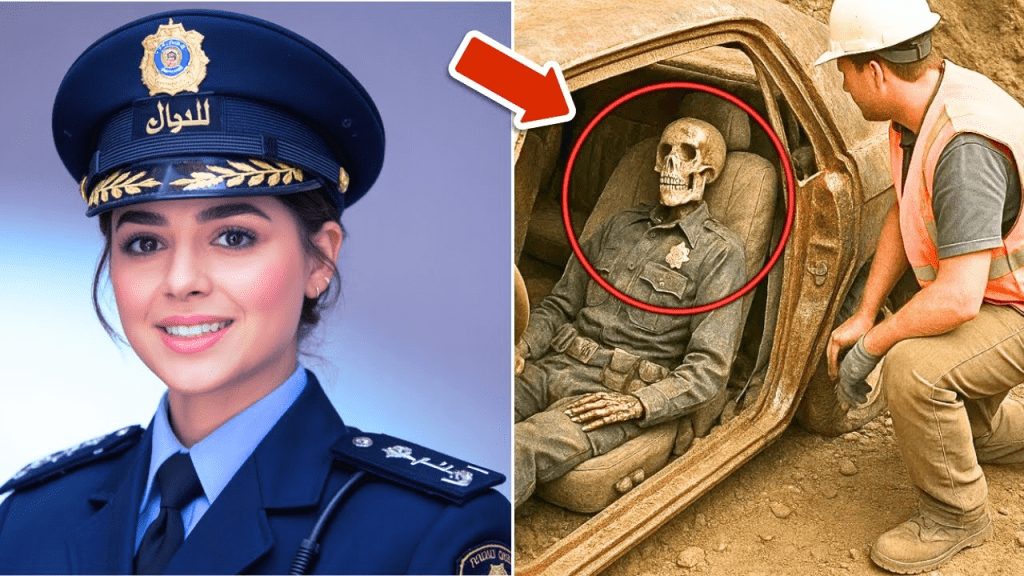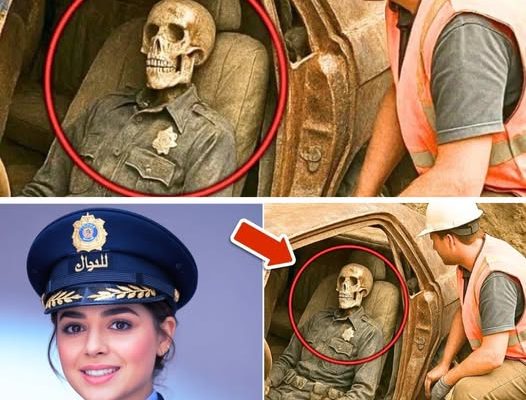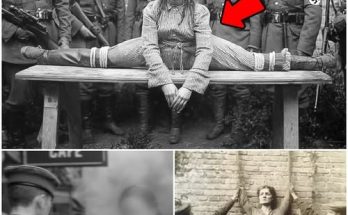The day began like any other in Riyadh’s Al-Olayya district. The sun beat down on a construction site, where the rhythmic clang of a pickaxe striking dirt was the only sound. Then, a peculiar discovery broke the monotony. A worker, Mahmoud Al-Zahrani, was digging the foundation for a new building when his tool struck something soft yet strangely resistant. It wasn’t rock or debris; it was a scrap of dark blue fabric, barely visible beneath the soil. As he knelt to investigate, a small, metallic object glinted in the sunlight. His heart sank when he realized what it was: a police badge.
Within moments, a team of officers descended upon the site, their yellow tape cordoning off the area. This wasn’t a simple find; it was the opening of a wound that had festered for 13 long years. The badge, clearly marked with a number, belonged to Officer Amina Al-Harbi, a dedicated policewoman who had vanished in 1991. The official story had been that she had voluntarily left her post, unable to handle the pressures of the job. The chilling truth, however, lay buried here all along.
Detective Laila Al-Qahtani, a woman known for her no-nonsense approach to criminal cases, arrived at the scene. Her gaze was fixed on the excavation pit as forensics specialists carefully lifted what remained of the uniform. A brass nameplate was unearthed, its number, 1247, still clearly legible. Laila’s gloved hand trembled as she held the piece of evidence. The name it bore, Amina Al-Harbi, was one she’d heard whispered about during her early days on the force—a story of a sudden disappearance, a closed case, a quiet resignation. But now, the cold facts began to speak for themselves. Amina hadn’t resigned; she was buried.
With a resolve that hardened in her eyes, Laila turned to her superior. “I need the old case files immediately. Especially the disappearance report from 1991.” She knew this wasn’t just another investigation. It was a confrontation with ghosts of the past, and with men who had no interest in seeing the truth unearthed.

A Family’s Unending Grief
The next morning, Laila found herself standing before a modest home in the Al-Naseem neighborhood. The peeling paint on the walls and the weathered wooden door spoke of years gone by. An elderly woman, her face etched with sorrow, opened the door. Laila introduced herself, and the woman’s eyes welled up with a fragile hope she had held onto for over a decade. “Have you found anything about her?” she asked, her voice trembling. “For 13 years, I have lived on the hope she would return.”
Inside, Laila was greeted by old photographs, each a testament to a life cut short. In one picture, a young Amina smiled proudly in her police uniform. Then, a man in his mid-30s entered the room, his calloused hands betraying a life of hard work. The mother introduced him as Sami, Amina’s brother. His first question was a gut-wrenching plea: “Is she alive?”
Laila chose her words carefully. “What we have found suggests she did not leave on her own accord. There is evidence of a crime.” The mother’s face crumpled as she began to sob, while Sami’s fist slammed the table. “I knew it!” he choked out. “Amina would never abandon her duty. She loved her job more than anything.”
Sami recounted the last day he saw his sister. It was the evening of September 3, 1991. She left in her uniform, telling him she was going to the police station to review some reports. She never returned. “We looked everywhere,” he told Laila, his voice thick with emotion. “Our superiors said she had run away with a lover. Brigadier General Mansour Al-Dosari was the one who spread those lies.”
Amina’s family was not surprised when she did not return, they were told she fled with a lover. Laila’s eyebrows shot up. “Was she in a relationship?” Sami shook his head. “No. She was alone and dedicated to her work. But two weeks before she vanished, she whispered something to me. She said she had seen something dangerous, that some of her colleagues were involved in ‘dirty business,’ and she had proof.” As Laila jotted down every word, she realized this was the break she had been looking for. If Amina had documented what she saw, those documents could be the key to everything.
A Tattered File and a Telltale Signature
Laila returned to the police headquarters, Sami’s words echoing in her mind. Her first stop was the archives. The clerk retrieved a small, dusty box. Inside, Laila found only a few sparse papers—far less than a case involving a missing officer would warrant. The notes were brief: date of report, September 3, 1991; status, preliminary follow-up; conclusion, voluntary resignation. There was no field investigation, no witness statements, no last-seen reports.
Laila’s lips curled in disgust. “This isn’t a file,” she muttered. “This is a cover-up.” Among the papers, a bold signature stood out: Mansour Al-Dosari. The very man Sami had accused. What was even more suspicious was that the file had been closed just 48 hours after Amina’s disappearance. She called in a veteran officer who had been on the force at the time. He shifted uncomfortably. “We had no part in it. The case was closed with strange speed. Mansour claimed it was a personal matter and that she had left on her own.”
Back in her office, Laila stared at Mansour’s name. Every clue pointed to him. If Amina had uncovered a dangerous secret, he would be the primary beneficiary of her silence. But Laila needed more than suspicion. She needed a witness, someone who had been with Amina on the night she vanished. A call to human resources revealed the name of the last officer to work with her: Major Nasser Al-Shammari. He was still on the force. A faint smile touched Laila’s lips. It was time to hear the truth from the man who had last seen Amina alive.
The Missing Testimony
Major Nasser Al-Shammari walked into the small interrogation room, his face a mask of weary solemnity. Laila cut to the chase. “You were the last person to work with Amina Al-Harbi on the night of her disappearance. I need to know everything you remember.”
Nasser leaned forward, placing his hands on the table. “It was a routine shift, from 10 p.m. to 6 a.m. We patrolled the streets of downtown Riyadh. Nothing out of the ordinary happened, except… she was quiet. Unusually quiet.” Laila raised an eyebrow. “She was usually very lively, always talking about her work, her future plans. But that night, she barely said a word.”
Laila produced a copy of his original 1991 report. “This report says Amina told you she intended to leave the city.” Nasser’s face contorted in a mix of shock and anger. “That’s not what I said! She never told me that. The signature is mine, but the text is forged.” He explained that Mansour Al-Dosari had personally taken his statement, a highly unusual move. “He wanted to close the case fast,” Nasser whispered. “He told us not to waste time on it and to tell people her behavior had been strange in the weeks leading up to her disappearance, which wasn’t true at all.” Then, he added a critical detail: “Two weeks before she disappeared, she asked me a strange question. ‘What would you do if you found out some of your colleagues were abusing their power?’ I knew then that she knew more than she was letting on.”
Laila’s mind raced. Amina had been on the verge of exposing a dangerous secret, and that’s why she never came back. But what was the secret that had cost her life?
A Confrontation with a High-Ranking Official
That evening, Laila drove to the sprawling home of retired Brigadier General Mansour Al-Dosari in the Al-Yarmouk district. The mansion was opulent, an impressive display of wealth for a man on a limited pension. Mansour, now in his 60s, opened the door himself, his face blanching slightly when Laila showed him her badge.
She sat in a lavishly decorated room, surrounded by Mansour’s awards and commendations. Laila didn’t waste time on pleasantries. “I’m here to ask about Amina Al-Harbi. She was under your command when she disappeared.” Mansour took a slow sip of coffee. “My memory isn’t what it used to be, but I recall she left on her own.” Laila placed Nasser’s original report on the table. “Major Nasser Al-Shammari says his statement was forged, and you were the only one who took it.”
Mansour’s eyes narrowed. “You believe every word he says?” Laila pressed on, her voice firm. “The case was closed in 48 hours. How do you explain that?” He stammered, “The girl was acting erratically; there was nothing to follow up on.” Laila’s gaze swept the luxurious room. “You’ve been retired for years, but you live like a wealthy man. Where did this money come from?” A thin veneer of a smile appeared on his face. “Old investments. I worked hard my whole life.” Laila knew he was hiding something. Every shift in his gaze, every hesitation, confirmed her suspicion. This man was not just a witness; he was a key player in Amina’s tragedy.
An Unlikely Ally and a Buried Truth
Laila’s investigation led her to an old mechanic’s garage on the outskirts of Riyadh. She found Tariq Al-Ghamdi, a former police officer known for his honesty, bent under an old car. When she mentioned Amina’s name, he sat down, his face full of pain. “Amina,” he sighed. “I never believed for a second that she ran away. She was brave and honest.” Laila leaned in. “Do you know what she was afraid of before she disappeared?” Tariq hesitated, then nodded. “She would sometimes talk to me about dangerous things she saw on night patrols. Some of our colleagues were extorting money from merchants. It was a whole network.”
“Did she mention any names?” Laila asked. Tariq shook his head. “She was afraid to say names, but she once told me, ‘Tariq, I have evidence. Photos and reports. If anything happens to me, everyone will know the truth.’”
That was all Laila needed. Amina had gathered evidence against a corruption network within the police force itself, which meant her disappearance was a pre-meditated murder, not a coincidence. If that evidence still existed, it was the key that would bring down the entire corrupt system.
The Confession and the Unveiled Conspiracy
Laila met with Adel Al-Muteiri, another former officer, in a quiet café. He was nervous, constantly looking over his shoulder. Laila’s direct approach broke through his fear. “We need to talk about the night Amina Al-Harbi disappeared. Her uniform was found; the truth will not stay buried.” Adel broke down, his face a mix of terror and regret. “I didn’t kill her. I swear I didn’t,” he sobbed. “But I helped Mansour get rid of the body.”
Laila’s heart pounded in her chest. “Help? Help with what?” Adel’s voice was barely a whisper. “He called me and another guy to help him move the body and bury it in an empty lot that was a construction site at the time.” He went on to say that Mansour had plotted everything, that Amina “knew too much.” They had searched her room and her office for the evidence she’d collected but found nothing. Just as Laila was about to leave, Adel added one last chilling detail. “Mansour wasn’t alone. There was someone bigger, pulling the strings from behind the scenes.”
Laila’s path was now clear. She returned to Mansour’s house, this time armed with a warrant. She confronted him with Adel’s testimony. Mansour’s facade of composure shattered. He confessed, his voice choked with emotion. Amina had come to his office that night with photos and documents, threatening to expose him and his network. She had screamed, and in a moment of panic, he had grabbed a paperweight and struck her. She didn’t move. He had then called Adel for help. Laila’s eyes blazed with fury. “Amina didn’t die because she was weak,” she said. “She died because she was strong enough to stand up to your corruption.”
But Laila knew Mansour was just a piece of a bigger puzzle. The question that now haunted her was: who was the man behind the curtain, the one pulling Mansour’s strings?
The Final Piece of the Puzzle
Laila’s search for Amina’s hidden evidence led her back to the Al-Harbi family. Sami recalled that his sister used to visit a distant relative’s old house in Diriyah to write her reports. Laila raced to the address, now occupied by another family. The new owners, a kind older couple, remembered finding a small, rusty metal box behind a wall in the cellar when they moved in years ago. They had never opened it.
Laila’s heart pounded as the man presented her with the box, its lid marked with the initials “A.H. 1991.” Inside, a treasure trove of evidence awaited. Dozens of photos of officers receiving money from local merchants. A small notebook with names, dates, and amounts. And a series of cassette tapes with recorded conversations. Everything was meticulously organized. “My God,” Laila whispered. “Amina wasn’t just brave; she was methodical. She left us a treasure map to the truth.”
The most shocking discovery came from one of the cassette tapes. It contained Mansour’s voice, but it was another voice that sent shivers down Laila’s spine—a deep, confident voice that Mansour addressed respectfully as “sir.” A voice analysis expert confirmed the identity: Major General Fahad Bin Rashid, the police director at the time, who had since risen to a high-ranking position in the Ministry of Interior. The corruption went all the way to the top.
The evidence was undeniable. Photos, recordings, and notebooks detailed a vast network of extortion. Laila, along with a special task force, presented the findings to the Public Prosecution Office. General Fahad was arrested in a synchronized operation that recovered more documents and millions of dollars in cash. His public screams of a “political conspiracy” were met with Laila’s cold retort: “It’s justice, delayed by 13 years.”
In a packed courtroom, Fahad Bin Rashid, Mansour Al-Dosari, and Adel Al-Muteiri stood trial. The evidence was presented, and the sentences were handed down. Fahad received a life sentence for leading the network and his role in Amina’s murder. Mansour was sentenced to 23 years, and Adel to 15. The mother of Amina wept, saying, “My daughter did not die in vain.”
Outside the courthouse, the Ministry of Interior announced the establishment of the “Amina Al-Harbi Program for Police Integrity,” a new initiative to protect whistleblowers and fight corruption. A bronze statue of a proud policewoman was unveiled at the entrance to the Police Academy, her badge bearing the name “Amina Al-Harbi, Martyr of Truth.”
Laila stood there, a profound sense of peace washing over her. Amina’s voice had not been silenced; it had become a cry for justice that would forever remind everyone that integrity never dies. But Laila knew the fight was not over. The documents recovered from Fahad’s safe contained new names, new crimes. The hunt for justice had just begun.



